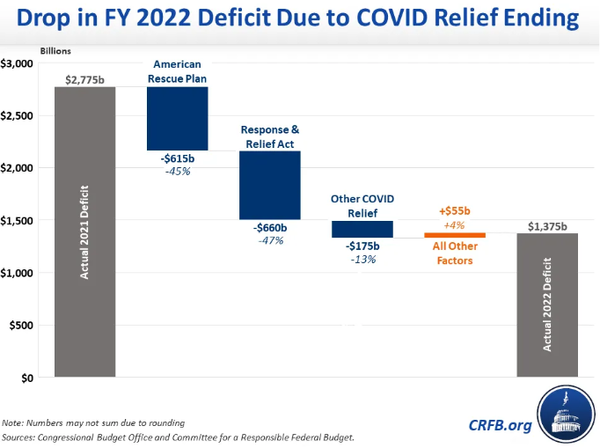Biden Claims to Have Reduced National Debt by $1.7 Trillion After Increasing National Debt by $4 Trillion

Despite the national debt increasing by roughly $4 trillion on his watch, Joe Biden is claiming that he actually lowered it by $1.7 trillion the first two years of his presidency.
Watch below:
When Biden took office the national debt was $27.75 trillion, and as of writing it stands at $31.7 trillion. While only Biden needs this clarified; 31.7 trillion actually a bigger number than 27.75 trillion, not 1.7 trillion smaller.
Biden has repeated the “$1.7 trillion debt reduction” claim numerous times in recent months, and it appears that he’s confused by his own White House’s talking points. According to an ironically-named “White House fact sheet” from March of this year, the administration claims “President Biden cut the deficit by more than $1.7 trillion during his first two years in office.”
In other words, Biden is confusing annual budget deficits with the cumulative national debt here. Regardless, the White House’s version of this talking point is just as false.
There is an appearance of truth to it if one doesn’t dive deeper into the figures; the budget deficit fell from $2.8 trillion to $1.4 trillion from fiscal year 2021-2022 for instance, accounting for most of the claimed $1.7 trillion reduction. However, in that same time period there was a $1.45 trillion drop in spending (104% of the deficit reduction) due to COVID programs either shrinking or expiring.
In fiscal year 2021 the deficit of $2.8 trillion was $360 billion lower than the $3.1 trillion Trump’s last full fiscal year in office, but the Congressional Budget Office estimated the deficit would’ve declined by $870 billion if the Biden administration didn’t implement any new policies and Trump’s remained in place. Or in other words, Biden contributed a disguised net $510 billion to the deficit that year.

As the Committee for a Responsible Federal Budget (CRFB) further notes: “Importantly, while economic changes reduced the deficit by $310 billion in FY 2022, they will actually increase deficits by over $1.5 trillion between 2023 and 2032 under CBO's baseline. Factors such as higher inflation tend to increase revenues in the near-term but increase spending and push up interest costs over time. “
By mid-2022 Biden had enacted policies that will add $4.8 trillion to the deficit through 2031 (according to the Congressional Budget Office’s estimates). By the same point in Trump’s presidency, his policies resulted in a net $2.5 trillion increase in the deficit, though this was largely due to policies that allowed people to keep more of their money.Matt Palumbo is the author of Fact-Checking the Fact-Checkers: How the Left Hijacked and Weaponized the Fact-Checking Industry and The Man Behind the Curtain: Inside the Secret Network of George Soros
Don't miss the Dan Bongino Show


